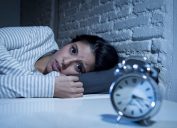5 Common Habits That Are Making You Anxious, Experts Say
You may not even realize these are spiking your stress levels.
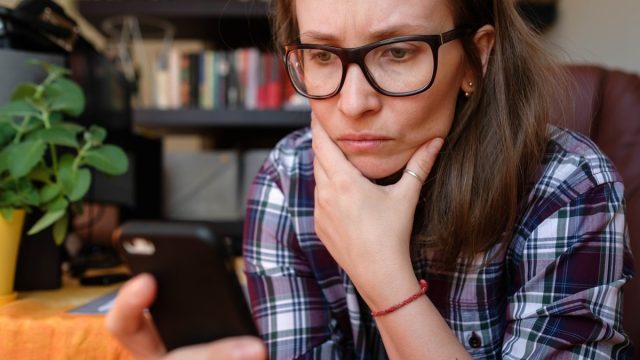
We all feel anxious now and then. For some people, anxiety is a fleeting feeling, while for others, it's a constant companion. The American Psychiatric Association estimates that nearly 30 percent of adults will be affected by an anxiety disorder at some time in their lives.
"Anxiety is a normal reaction to stress and can be beneficial in some situations," they write, explaining that anxiety can tip us off to danger and keep us on our toes. Experts say there are certain habits that can make you anxious, however, even when there's no threat to your safety.
When I start feeling what I think of as "free-floating anxiety," I try to figure out where it's coming from, usually without much luck. Could something I'm doing be contributing to my unease? Read on to find out what the therapists I spoke with said about five common habits that can put us on edge unnecessarily—and how we can calm ourselves down.
READ THIS NEXT: 5 Unexpected Health Issues That May Be Caused by Anxiety, Experts Say.
1
Looking at your phone as soon as you wake up
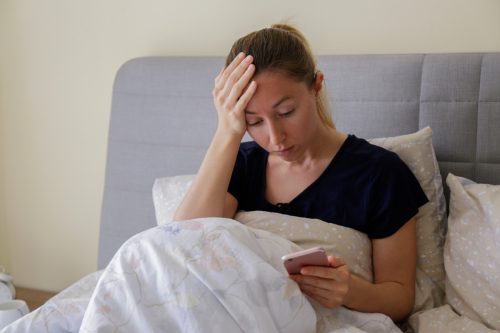
Even though I sleep in a different room from my phone, I almost always make a beeline for that glowing rectangle as soon as I'm awake. While my coffee maker gurgles to life (it's decaf, of course—I already know caffeine makes me a jittery, anxious mess), I scroll through my social media feeds.
This is my first mistake, says Amy Mezulis, PhD, co-founder and chief clinical officer of Joon.
"This behavior starts off our day by bombarding our brain with information, causing us to feel anxious about all that we need to do—all before we've had a chance to let our mind or body wake up," she tells me. "Those posts, news reports, and emails will still be there in 15 or 20 minutes after your morning stretch, first cup of coffee, or morning meditation." She says waiting will let me take in the information "from a much calmer place."
So what should I do instead of checking to see how many people liked the Instagram story I posted before I went to bed? Daniel Rinaldi, MA, a therapist and life coach with Fresh Starts Registry, suggests implementing a new morning routine.
"Give yourself more time to ease into the day and engage in things like meditation, or perhaps journaling or listening to music. Create a morning playlist that you only listen to in the mornings and puts you at ease (or helps you dance around the room!)"
2
Underestimating how long things take

Some people are always early; I've never been one of them. Born two weeks late, I'm still trying to catch up—or at least, that's the joke I make every time I pull up just in the nick of time, sweaty and apologetic. In fact, the reason I'm chronically running late is that I pack my schedule too tightly, thinking I can do more than I realistically can.
"Many of us, especially if we have a tendency toward perfectionism or overworking, have a hard time being done when it is time to change tasks," says Mezulis. "We keep feeling like we should do just one more thing—reread that email, check that we've packed those shoes—mostly out of a fear of having left something unfinished or incomplete."
Yes! This sounds like me. But how can I change my ways?
"One way to try to reduce this behavior is to set a specific time that you'll stop and transition to the next activity, rather than saying 'I'll transition when I'm done,'" Mezulis suggests. "And if you know you constantly underestimate that time, practice building in a buffer. If you think it'll take 10 minutes, give yourself 20 for a week to see what it feels like to not be rushing late to everything. You might like it!"
3
Watching the news
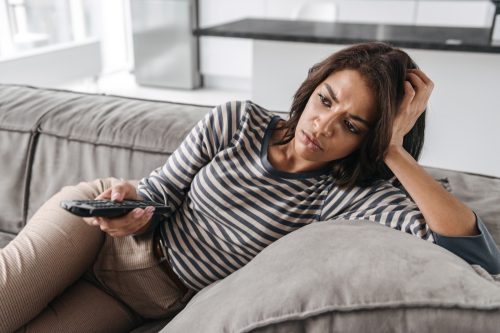
An Aug. 2022 study published in Health Communication found that people who obsessively consumed news media were more likely to not only suffer from stress and anxiety, but from poor physical health. Bryan McLaughlin, associate professor of advertising at the College of Media and Communication at Texas Tech University and the study's lead author, said in a press release that the news of the past few years—a global pandemic, political unrest, mass shootings, wars, and wildfires—has impacted many of us profoundly.
"Witnessing these events unfold in the news can bring about a constant state of high alert in some people, kicking their surveillance motives into overdrive and making the world seem like a dark and dangerous place," he explained.
And while he feels people ought to keep up with current events, he stressed that it's also important to "have a healthier relationship with the news."
Rinaldi suggests limiting your exposure to the news, especially negative news stories. "Only allow yourself specific times to consume news, and preferably not right when you wake up or right when you go to bed," he says.
For more health advice sent directly to your inbox, sign up for our daily newsletter.
4
Getting into arguments on social media
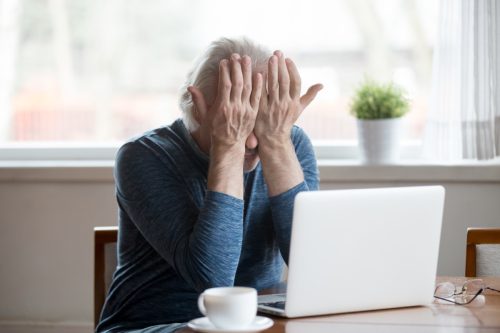
What do many of us like to do after consuming a heaping helping of negative news? Go online and get on our soapbox, picking fights with our "friends" on social media. But while you might feel you're letting off steam, you could in fact be fueling the fire of your anxiety.
A May 2022 study published in Cyberpsychology, Behavior and Social Networking suggests that taking a break from this behavior for just one week could reduce your anxiety and increase your feelings of well-being.
Not ready to swear off social media, even for a few days? Rinaldi suggests changing the way you use it.
"Engage in positive interactions," he offers. "Put out positive content and avoid content that increases anxiety." Perhaps you'd like to share this lighthearted list of bee-based puns with your social network?
5
Not breathing deeply enough

When I'm rushing around, mentally going over my to-do list over and over, I often realize I'm holding my breath. But am I having trouble breathing because I'm anxious, or is my anxiety triggered by the lack of oxygen? Mezulis says it's a chicken-or-egg situation.
"Our anxiety level and our physical state are very closely related. When we are anxious, our body's sympathetic nervous system kicks in (you've heard of the 'fight or flight' response). Our pupils dilate, our heart rate increases, our blood flows away from our extremities to our major muscles, we shut down digestion, and we start breathing very rapidly and shallowly," she explains.
The problem, she says, is that this relationship goes both ways.
"Anxiety can make our breathing shallow, but shallow rapid breathing can also make us feel anxious, as the body and mind are trying to sync their experiences." She suggests "square breathing," which I'm familiar with—it's my first line of defense against a panic attack—but have always called "box breathing."
"A square has four equal sides, so it is a pattern of breathing in four equal parts," she notes. "Breathe in for five seconds, hold for five seconds, breathe out for five seconds, and hold the out breath for five seconds. Do this five times and you'll find your anxiety coming down right away."
Best Life offers the most up-to-date information from top experts, new research, and health agencies, but our content is not meant to be a substitute for professional guidance. If you have health questions or concerns, always consult your healthcare provider directly.









